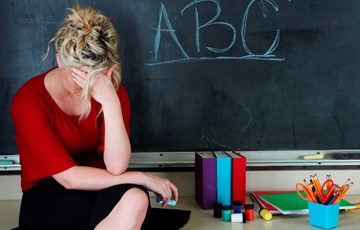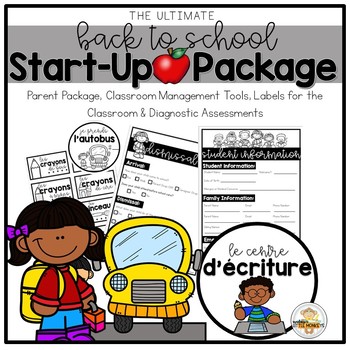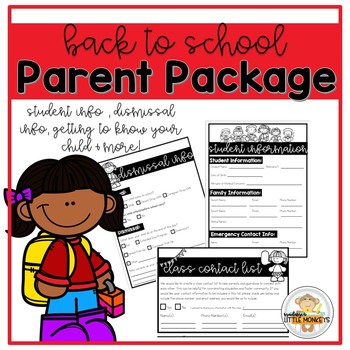
Ok so ‘surviving’ is probably too dramatic a term here, but honestly there have been times when I have felt that I just barely crawled across the finish line on the Friday of the first week of school. The first few days as an early years educator are emotional, scary, exciting, and wildly overwhelming for the kids and adults alike. Over the years, I have learned a few things that help to make the first week of school easier when teaching little ones. Don’t get me wrong, I still feel like there should be a victory parade (or at least a good glass of wine) waiting for me at the end of the week, but I now feel more confident and much less stressed about back to school than I did when I first started out. Here are a few things that help to keep me sane in those first few days of September.
1) Keep it Simple.
I used to scour Pinterest for clever ideas that would engage and excite my new learners on the first days of school, only to be disappointed when the elaborate plans I had, or the fun activity I had planned, went awry due to a) not knowing my kids well enough, b) not having yet established rules and routines and c) someone sobbing so loudly I couldn’t explain the activity in the first place (and no, the sobbing wasn’t coming from me). Which leads me to tip #2.

2) Make your students feel comfortable.
As you welcome young learners into your room, you want to ease their worries, calm their nerves and make them feel calm and comfortable as quickly as possible. Some ideas that my colleagues and I have used in the past are: a collection of books and stuffed animals waiting for them on the carpet, a dance party with popular, upbeat songs, a collection of familiar table top activities (like Lego, playdough, or puzzles). Essentially, anything that will be comforting and familiar will do the trick and will make for a soft start to the school year.
3) Plan. It. All.
If you are a more experienced teacher, you may not plan every minute of your day any more, as things come more naturally and you are able to be more spontaneous with your teaching style. This is not the time for spontaneity, people! It will make you feel so much better to have a clearly defined plan for these first few days. This doesn’t mean you don’t change said plans when three students are bawling, another has an accident, and still another starts running out the door. Of course be responsive in your teaching, but start with a strong plan.
4) Intros, Routines, Tours
Notice that I didn’t include ‘rules’ here. Many people would suggest that you go over rules with your students right away. I do speak with our students about our classroom values and expectations and we come up with these together, however I don’t do this right away. Just a personal preference. But I do find that they are able to hear and understand what I am saying more when they have gotten accustomed to and comfortable in our classroom community.
I do try to keep our routines in the first few days the same as our flow of the day will look in the coming weeks and months so that we can establish order and routine early. Kindergarten students thrive when there is routine and consistency. Infused into our daily routine, I will add introduction games and tours of our classroom and school building.
5) Dismissal Lists and Tags
I make sure to get the necessary information about pick up and drop off from my students’ parents ahead of time but I also check in with whoever drops the student off, how they will be going home. Keep a clear and organized dismissal list on a clip board for the end of day. I also take time on the first day to attach a dismissal tag to each child’s back pack. This indicates how they will go home so you can easily see who should line up where. You can grab my dismissal tags and dismissal list here:
6) Class lists
A couple different class lists are a great idea. I prepare 3 different class lists for each class that I teach: 1) a class list with photos of each student (this helps with remembering names and is great for a guest teacher binder), 2) a checklist version of the class list (can be used for assessments, projects, attendance, etc), and 3) a lanyard-sized class list (a very small version that I wear in a badge protector attached to my lanyard so that I can always quickly and efficiently check if all my students are present, no matter where I am.
7) Sing and Dance
Sing lots of songs with your students. Keep them simple and fun and add actions or a game along with them.
8) Communication with Teaching Colleagues
Communication is key in a kindergarten classroom. Strong communication with your teacher and ECE colleagues is so important for success in the first week of school. Plan to meet before school starts if possible to go over your combined expectations, a flow of the day/schedule, a plan for who will take on what in the classroom and how you will share the space. Students will be able to sense whether their educators are part of a cohesive, well-organized team or not. We also use this simple communication sheet to keep each other in the loop about who is absent, who will be leaving early, etc. Click on the picture below to sign up and get your copy in my FREE Resource Library!
9) Establish Strong Lines of Communication with Parents
Communication with parents is also key. For some of your classroom parents, this will be the first time that their babies are away from home for a full day school program. I like to help ease their worries by sending a quick email on the first day, telling them how great the day went and another email at the end of the week with a few photos. If you do not have intake interviews before school starts, you should also send home any forms that need to be filled out and information about your class community. This can be info about how you celebrate birthdays, scheduled library visits, information about their child’s educators, a request for more info about their child, etc. The packet I hand out in the first week and at intake interviews can be found here:
10) Remember that you are only human.
Ok so maybe I'm just including this as a reminder for myself, but I'm sure that others could use a reminder of this as well. Give yourself grace! The first weeks of school for any teacher are overwhelming and very demanding. For a kindergarten or early years educator, they are 10 times more difficult! Remember that our sole mission this week is to help our little learners feel comfortable and cared for during this big transition period and don't worry about the rest!
Joyeuse rentréee!
xo Jess
Ok so maybe I'm just including this as a reminder for myself, but I'm sure that others could use a reminder of this as well. Give yourself grace! The first weeks of school for any teacher are overwhelming and very demanding. For a kindergarten or early years educator, they are 10 times more difficult! Remember that our sole mission this week is to help our little learners feel comfortable and cared for during this big transition period and don't worry about the rest!
Joyeuse rentréee!
xo Jess



